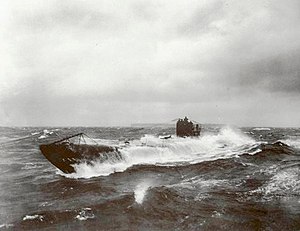SM UB-111
 UB-148 at sea, a U-boat similar to UB-111.
| |
| History | |
|---|---|
| Name | UB-111 |
| Ordered | 6 / 8 February 1917[1] |
| Builder | Blohm & Voss, Hamburg |
| Cost | 3,714,000 German Papiermark |
| Yard number | 317 |
| Launched | 1 September 1917[2] |
| Commissioned | 5 April 1918[2] |
| Fate | Surrendered 21 November 1918, broken up[2] |
| General characteristics [2] | |
| Class and type | Type UB III submarine |
| Displacement | |
| Length | 55.30 m (181 ft 5 in) (o/a) |
| Beam | 5.80 m (19 ft) |
| Draught | 3.70 m (12 ft 2 in) |
| Propulsion |
|
| Speed |
|
| Range |
|
| Test depth | 50 m (160 ft) |
| Complement | 3 officers, 31 men[2] |
| Armament |
|
| Service record | |
| Part of: |
|
| Commanders: |
|
| Operations: | 3 patrols |
| Victories: |
7 merchant ships sunk (694 GRT) |
SM UB-111 was a German Type UB III submarine or U-boat in the German Imperial Navy (German: Kaiserliche Marine) during World War I. She was commissioned into the German Imperial Navy on 5 April 1918 as SM UB-111.[Note 1]
UB-111 was surrendered to Britain on 21 November 1918 in accordance with the requirements of the Armistice with Germany and broken up in Bo'ness in 1919-20.[2]
Construction
[edit]She was built by Blohm & Voss of Hamburg and following just under a year of construction, launched at Hamburg on 1 September 1917. UB-111 was commissioned in the spring the next year under the command of Kptlt. Egon von Werner. Like all Type UB III submarines, UB-111 carried 10 torpedoes and was armed with a 8.8 cm (3.46 in) deck gun. UB-111 would carry a crew of up to 3 officer and 31 men and had a cruising range of 7,420 nautical miles (13,740 km; 8,540 mi). UB-111 had a displacement of 519 t (511 long tons) while surfaced and 649 t (639 long tons) when submerged. Her engines enabled her to travel at 13.3 knots (24.6 km/h; 15.3 mph) when surfaced and 7.4 knots (13.7 km/h; 8.5 mph) when submerged.
Summary of raiding history
[edit]| Date | Name | Nationality | Tonnage[Note 2] | Fate[4] |
|---|---|---|---|---|
| 24 August 1918 | Hollandia | 103 | Sunk | |
| 24 August 1918 | Majoor Thomson | 113 | Sunk | |
| 24 August 1918 | Maria Johanna | 126 | Sunk | |
| 24 August 1918 | Neerlandia II | 100 | Sunk | |
| 24 August 1918 | Neerlandia III | 117 | Sunk | |
| 24 August 1918 | Secunda | 30 | Sunk | |
| 24 August 1918 | Stella | 105 | Sunk |
References
[edit]Notes
[edit]- ^ "SM" stands for "Seiner Majestät" (English: His Majesty's) and combined with the U for Unterseeboot would be translated as His Majesty's Submarine.
- ^ Tonnages are in gross register tons
Citations
[edit]- ^ Rössler 1979, p. 66.
- ^ a b c d e f Gröner 1991, pp. 25–30.
- ^ Helgason, Guðmundur. "WWI U-boat commanders: Egon von Werner (Royal House Order of Hohenzollern)". German and Austrian U-boats of World War I - Kaiserliche Marine - Uboat.net. Retrieved 9 March 2015.
- ^ Helgason, Guðmundur. "Ships hit by UB 111". German and Austrian U-boats of World War I - Kaiserliche Marine - Uboat.net. Retrieved 9 March 2015.
Bibliography
[edit]- Bendert, Harald (2000). Die UB-Boote der Kaiserlichen Marine, 1914-1918. Einsätze, Erfolge, Schicksal (in German). Hamburg: Verlag E.S. Mittler & Sohn GmbH. ISBN 3-8132-0713-7.
- Gröner, Erich; Jung, Dieter; Maass, Martin (1991). U-boats and Mine Warfare Vessels. German Warships 1815–1945. Vol. 2. Translated by Thomas, Keith; Magowan, Rachel. London: Conway Maritime Press. ISBN 0-85177-593-4.
- Rössler, Eberhard (1979). U-Bootbau bis Ende des 1. Weltkrieges, Konstruktionen für das Ausland und die Jahre 1935 - 1945 | Die deutschen U-Boote und ihre Werften (in German). Vol. I. Munich: Bernard & Graefe. ISBN 3-7637-5213-7.
